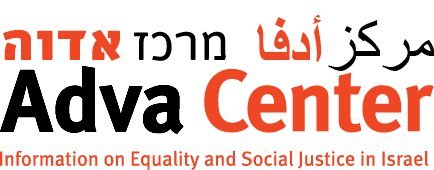How the Occupation Affects our Lives
The word "occupation" brings forth many images: right against left, settlers against the IDF, the Defense budget, boycotts of products from the occupied territories, BDS, the mantra "there is no partner for peace."
But few talk about its impact on Israel's standard of living.
Here's how the Occupation Affects our Lives
The Occupation:
Who Pays the Price
Shlomo Swirski and Noga Dagan-Buzaglo
June 2017
The Occupation Leads to Recessions
Economic recessions that follow every violent confrontation with the Palestinians – these constitute the highest socio-economic price that Israeli society as a whole pays for continuation of the occupation. This economic instability prevents Israel from achieving the same standard of living as Western countries.
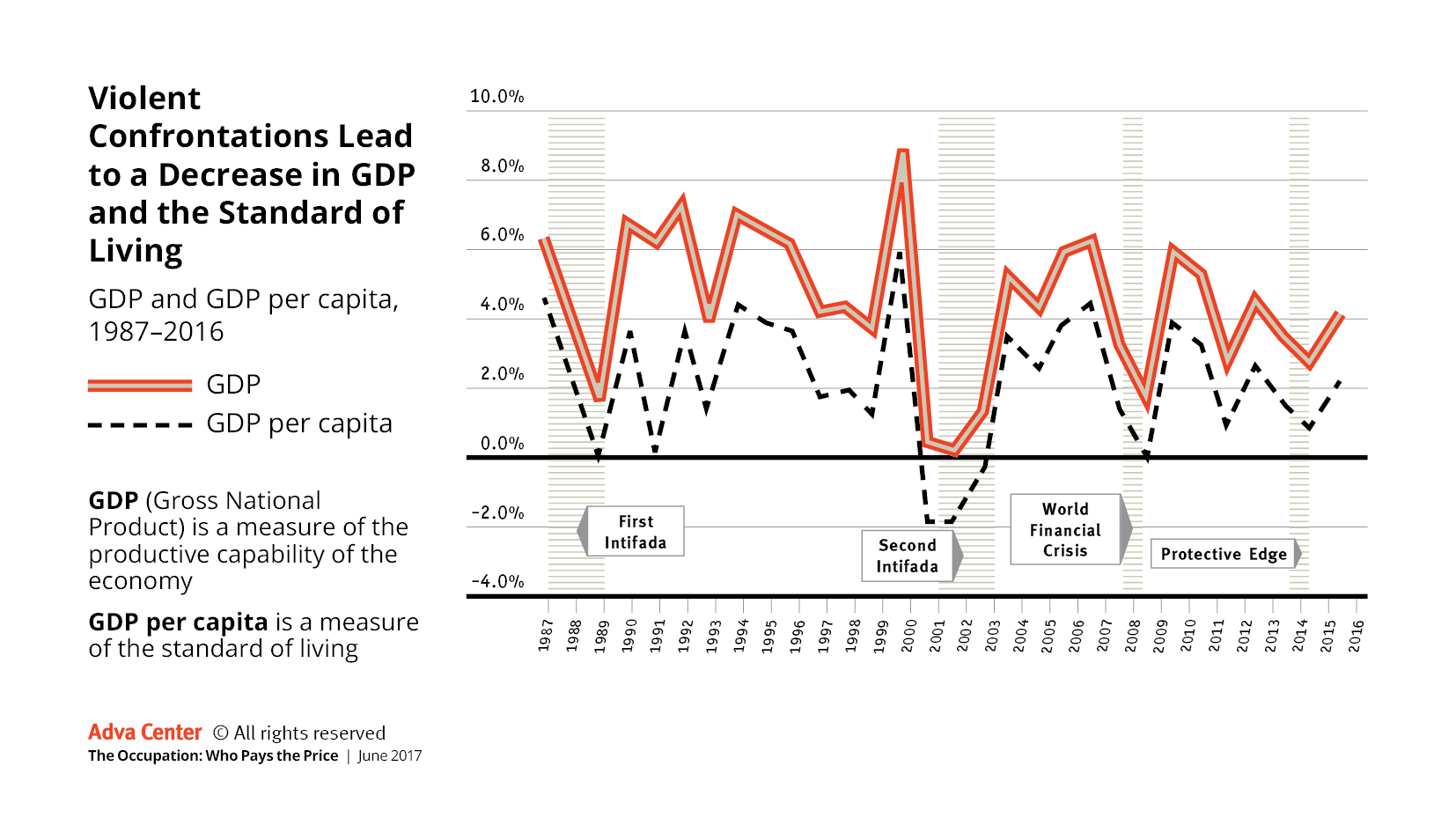
Israel's GDP decreased following both the first and the second intifadas. It also decreased following the world financial crisis of 2008. The greatest damage was wrought by the second intifada, as the Bank of Israel stated clearly, ". . . we are experiencing . . . the longest recession in our history." The Bank went on to say, "The recession is the result of two negative shocks – escalation of the armed conflict with the Palestinians [the intifada] together with the slowdown in world trade and global slump in the hi-tech industry. Unlike 2001, when reduced GDP caused by the intifada was comparable to the loss from the decreased demand for Israeli exports [resulting from the hi-tech slump], in 2002 the intifada was the primary cause of the contraction of economic activity."
The economy experienced two years of negative growth (production not only failed to grow, it declined) and three years of negative growth in GDP per capita – that is, a real decrease in the standard of living.
For the standard of living to rise, Israel needs a long period of steady growth in GDP per capita.
The intifadas and the attendant economic crises seem to have happened a long time ago. However, absent a political settlement, such events are likely to return. Since the last intifada, there have been frequent violent clashes like "Protective Edge" and "Pillar of Defense," each of which resulted in damage to the Israeli economy.
The Occupation Requires High Defense Expenditures
During the three decades of the Palestinian resistance to the occupation, between 1988 and 2010, the Defense Ministry received budget supplements for "events in the territories" amounting to NIS 55.6 billion (in 2016 prices). This amount is larger than the 2017 budget of the Ministry of Education – NIS 52.5 billion. And it refers to supplements only – not to the basic cost of military units policing the territories and other expenditures.
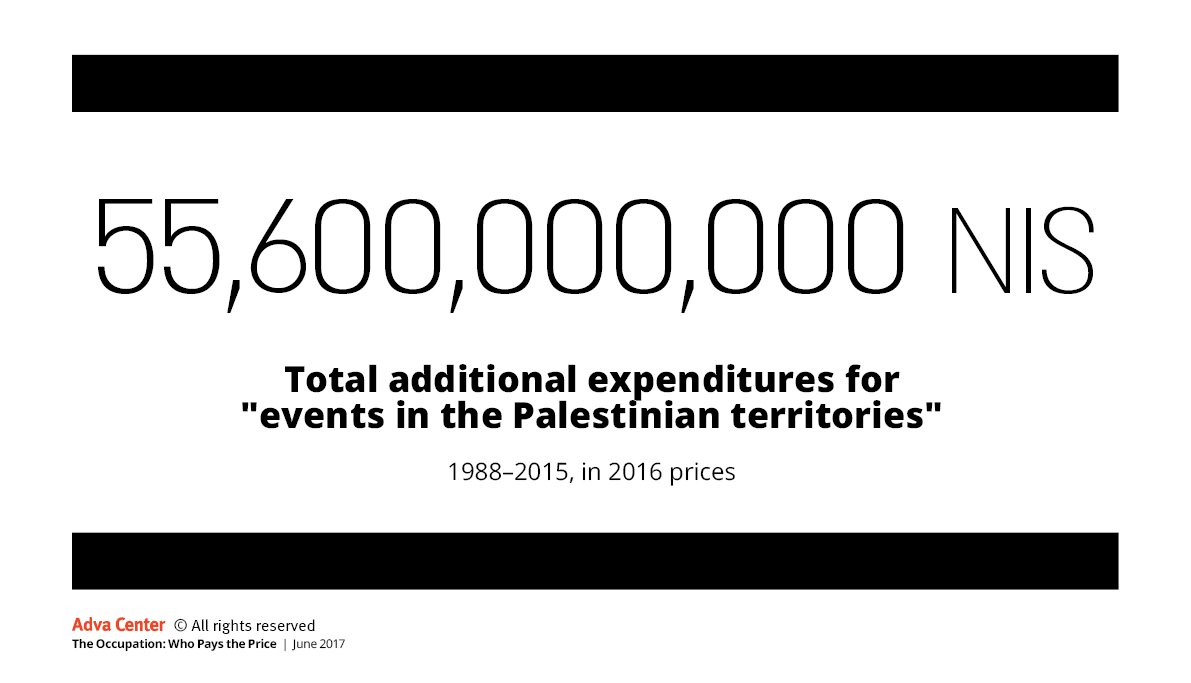
Since the first intifada, control and policing of the Palestinian territories has become Israel's primary ongoing military mission. The full scope of these expenditures cannot be ascertained, primarily because the Defense Ministry budget is not made public in its entirety. Even if it were, it would probably not be possible to establish which budget lines apply directly and exclusively to events on the Palestinian front and which relate to other matters.
Defense expenditures also include a good part of the budget of the Ministry of Internal Security. The forces under this ministry became an important element of Israel's defense apparatus, especially after Palestinian opposition to the occupation took the form of attacks on civilians.
Between 1994 and 2015, during which Israel experienced intermittent attacks on civilians, the budget of the Ministry of Internal Security increased by 350 percent.
The Occupation is Bad for Tourism
Tourism is especially sensitive to political instability, and all the more so to violent confrontations and clashes. The number of tourists visiting Israel in 2015 – 2.8 million – was much lower than the number visiting other countries in the region. The result: unrealized potential for economic growth and income in foreign currency.
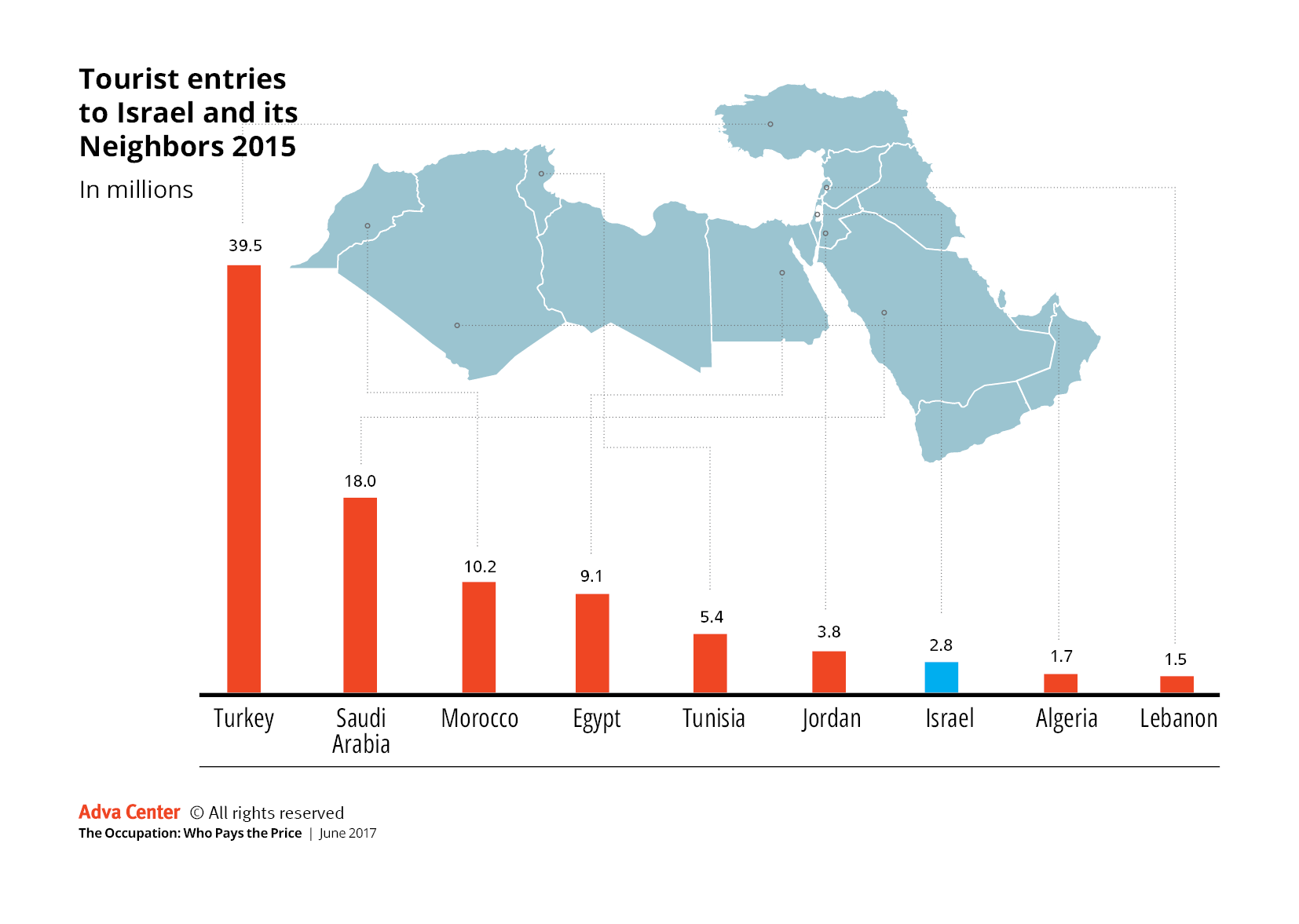
Israel – and the Palestinian Authority – is defined as a conflict area. The result is that although they are endowed with tourist sites no less attractive than those of their neighbors, they have fewer visitors. Thus, the number of tourists visiting Israel in 2015 was significantly lower than those visiting Turkey, Morocco or Saudi Arabia that year. It was even lower than the number of tourists entering Egypt or Tunisia, countries suffering from post Arab-Spring violence.
Shock Doctrine
The Occupation Brought on Fiscal Austerity
The crisis set off by the second intifada enabled the Israeli government to implement a long-term policy of fiscal austerity. One of the results: Israel's social expenditure, the main ways and means of realizing social goals, is one of the lowest in all OECD countries.
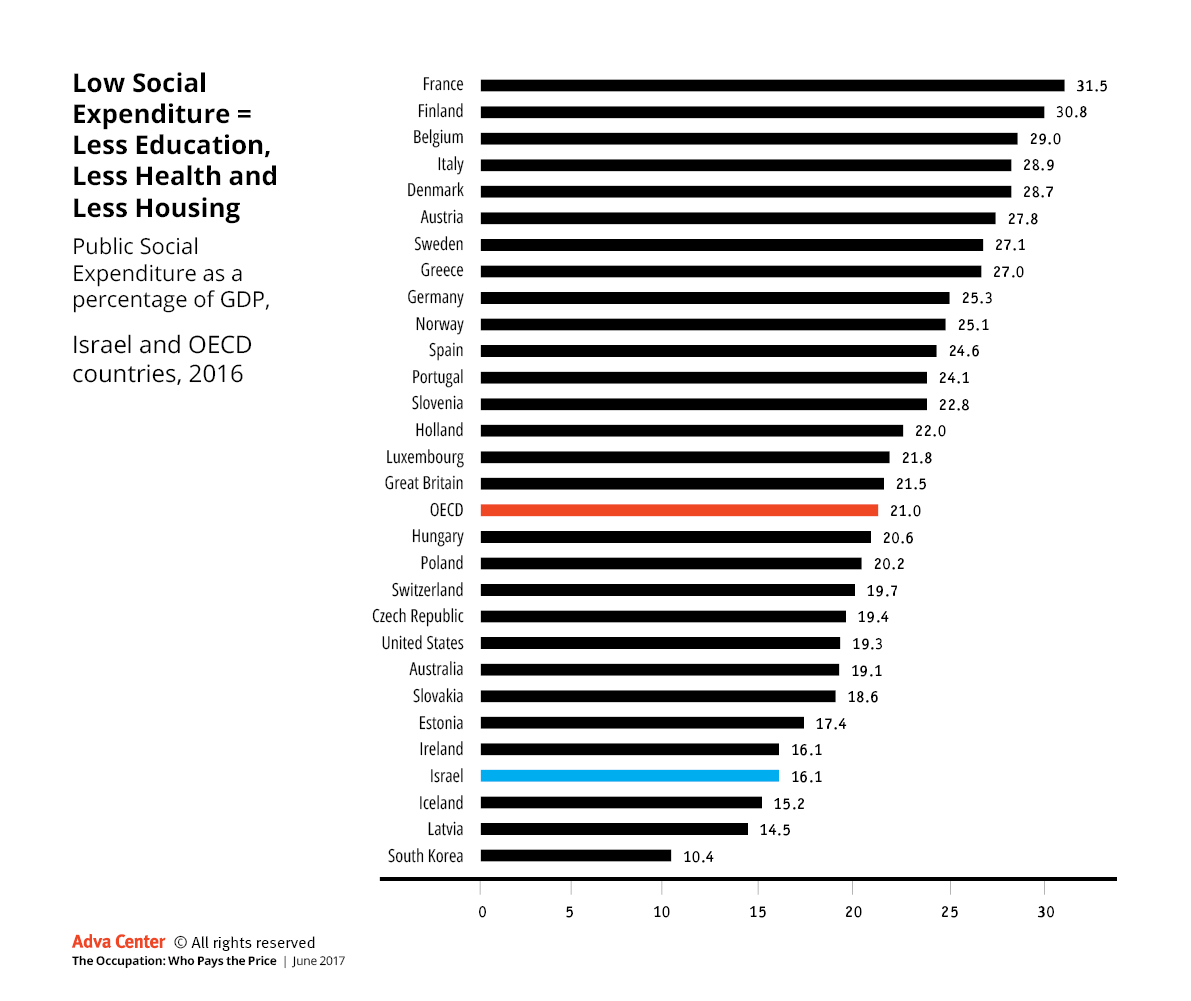
Austerity policies are intended to convey a message of economic stability and fiscal responsibility and to cultivate the image of a state with which one can do business, despite political and military instability.
The policy of fiscal austerity began back in 1985, in the framework of the Emergency Economic Stability Plan. However, the crisis brought about by the second intifada gave it an extra push. The result of fiscal austerity: whereas in 2001 the state budget amounted to 44% of GDP, by 2016 it amounted to only 35%.
The policy of fiscal austerity has some positive ramifications: Government debt is lowered. And indeed, between 2004 and 2016, Israel's national debt decreased from 95.9% of GDP to 62.2%. The smaller the debt, the less is needed to pay out as interest. The savings in interest payments can be spent on schools, hospitals and social security (In actuality, the Ministry of Finance often used the money saved to further reduce the national debt).
But a fiscal austerity policy also has negative consequences, primarily for countries that are not affluent and require significant investment in infrastructure, economic development and public services in order to attain a western standard of living. In such countries, deferring investment in order to maintain a low debt-to-GDP ratio means long years of low investment and the sacrifice of a generation, perhaps several generations, who will have to make do with a low standard of living.
The Occupation Eroded Israel's Social Safety Net
The shock of the second intifada set off a harmful reversal in Israel's social policy, reflected mainly in the erosion of social security. Massive cuts were made to the benefits paid out by the National Insurance Institute, especially income maintenance, child allowances and unemployment compensation.
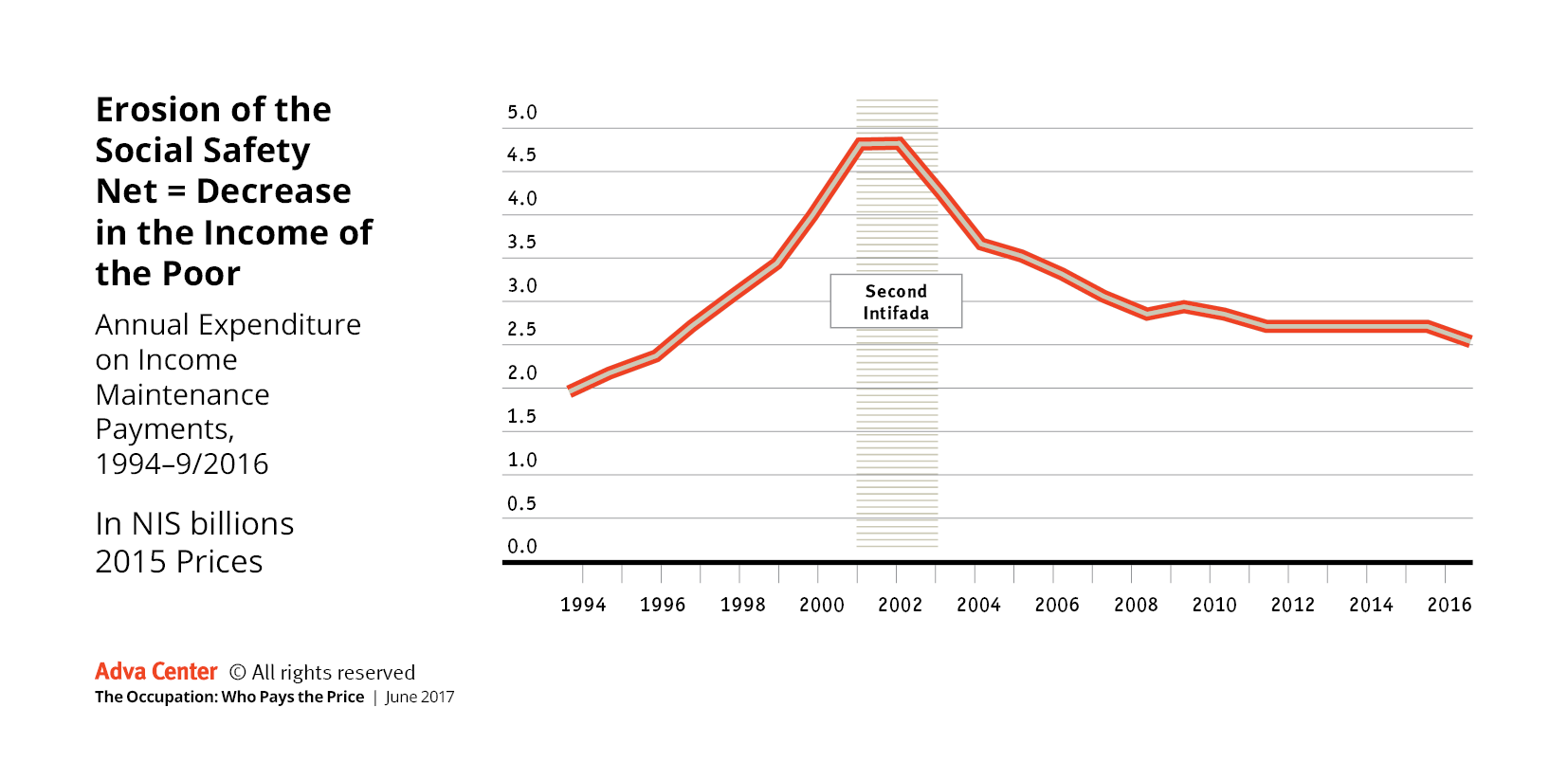
The shock of the second intifada and the policy of fiscal austerity adopted at the time underlie one of the most harmful reversals in the history of social policy in Israel. Massive cuts were made in 2002 and 2003 to the benefits paid out by the National Insurance Institute. These increased the number of Israelis living in poverty and weakened the support systems of low wage earners, the unemployed and large families.
The Occupation Maintains Inequality at a
High Level that Keeps Getting Higher
Israel "boasts" one of the highest degrees of inequality among OECD countries. The occupation is a contributing factor: it slowed down the growth of GDP per capita, it created a broad stratum of cheap laborers (Palestinians, and later, foreign workers), it led to erosion in the social safety net and it determined a public agenda whose main concern is not inequality but the conflict with the Palestinians.
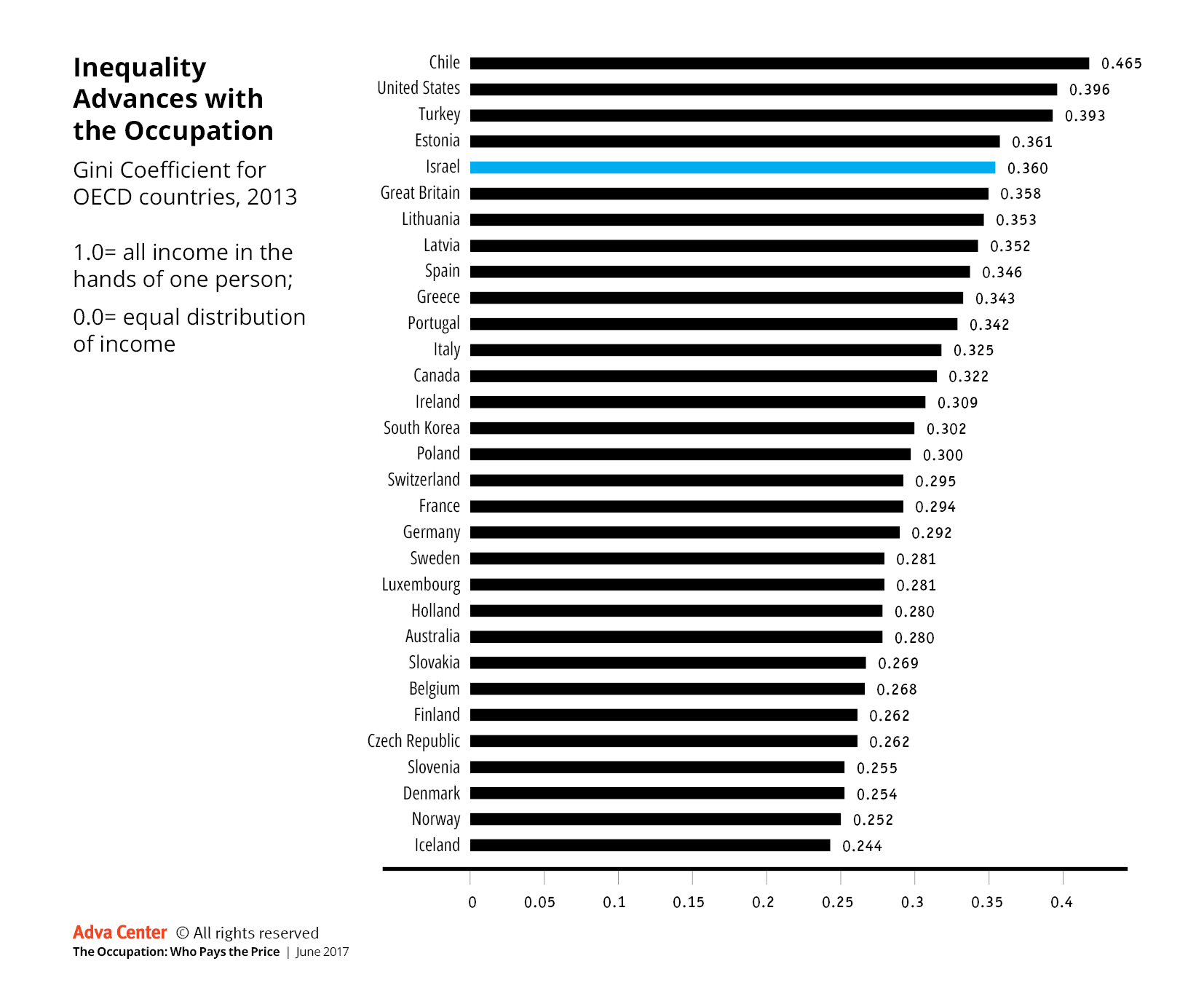
Israel maintains civilian and military space satellites. It provides R&D centers for most international hi-tech companies. It is known as "the start-up nation." At the same time, it "boasts" one of the highest inequality levels among OECD countries and a large proportion of low-wage earners. Nearly half of its 17 year-olds fail to matriculate. And most of the country is defined as belonging to the social and economic periphery.
The occupation contributes to inequality in the following ways:
- It causes economic instability, which in turn slows down growth in GDP per capita;
- It opens Israel's doors to Palestinian workers and, in their wake, to foreign workers, who weaken the bargaining power of Israeli workers;
- High defense outlays and the economic crisis brought about by the second intifada result in less social security and a higher poverty rate;
- It places the conflict – and not inequality – at the top of the public agenda.
The Occupation: Who Doesn't Pay the Price
Middle and low-income Israelis are the ones who pay the price of the occupation. As for affluent Israelis, instead of higher taxes to finance high defense outlays, they received an exemption in the form of the tax "reform" program of the Sharon-Netanyahu government, whose effect was to enrich mainly the top income decile.
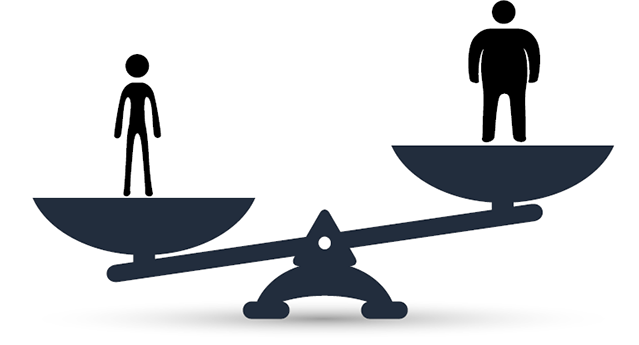
The second intifada led to cuts in social expenditures in order to free monies for defense outlays. But things could have been different. For example, income and corporate taxes could have been raised. Instead, the incumbent Finance Minister, Binyamin Netanyahu, made the absurd decision to implement unprecedented tax cuts. These benefited mainly persons in the highest income bracket: persons with monthly incomes of NIS 25,000 and over received additions of between NIS 2,000 and NIS 5,000 per month. In other words, one hand of this government gave a handsome gift to the rich, while the other hand slashed allowances for persons in need, including those whose monthly income was no higher than the extra money the affluent would now receive thanks to the tax cuts.
Lowering taxes is routinely justified by economists: Lower taxes contribute to growth, on the assumption that more disposable income leads to more private consumption as well as more investment in the economy, which in turn creates new jobs. This explanation is consistent with the neoliberal approach that advocates the least possible taxation. But it also appears that in the context of the loss of confidence and instability that accompanied the second intifada, reduced taxes were also an attempt to prevent the golden-egg-laying hen from flying the Israeli coop – the hi-tech industry. The chair of the commission that recommended the cuts, CPA Yair Rabinowitz, noted that one of the main purposes of lowering taxes was "to keep human capital in Israel."
The tax cuts freed Israel's affluent from the burden of paying for the consequences of the occupation.
Some are More Equal than Others
The occupation and the accompanying desire to hold onto the occupied territories led to a new national project – the settlements. The settlements continue to enjoy a clear preference in many areas, prominently among them central government contributions to municipal budgets. This preference enables the settlements to free resources for local development that other localities cannot afford, especially development towns and Arab localities.
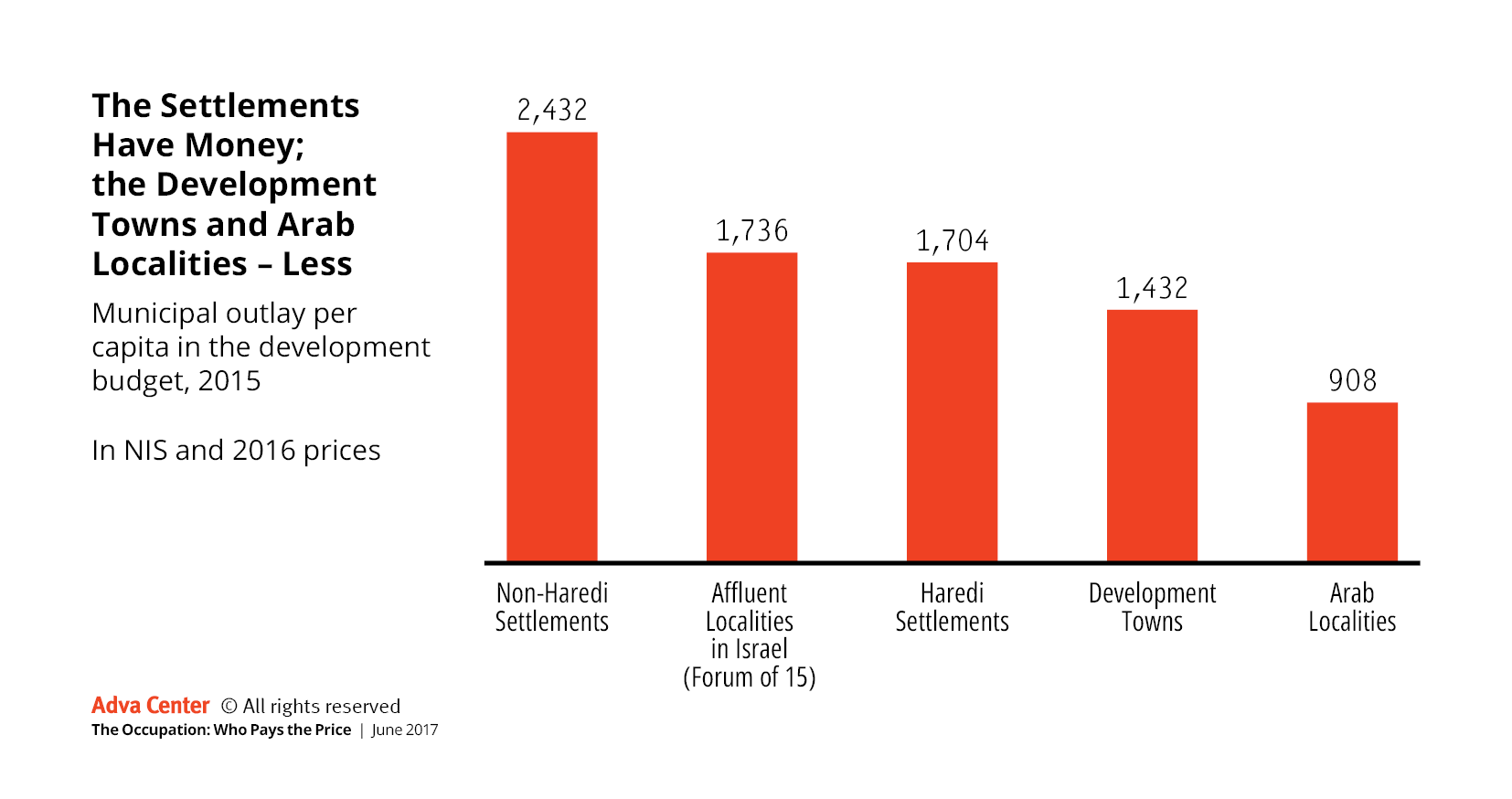
The occupation led to new government priorities, the most prominent among them a preference for the settlements. This project began just a few years after another national project was abandoned even before it was completed – the absorption of more than a million Jews who had arrived in Israel between 1948 and the beginning of the 1960s. During this time, more than 300 immigrant farming communities and nearly 30 development towns were set up.
By 1967 most of the development towns were not yet stable and well established. Somewhat later, while the settlements were undergoing a wave of expansion, the development towns experienced negative migration that continued until there was a new wave of immigration from the former Soviet Union and Ethiopia in the 1990s. It was only then that the population of the towns began to grow once again; however, in the meantime they had become stigmatized as "periphery."
Arab localities suffered even more from under-development. One example of this concerns industrial parks. In many Arab localities there is no land available for the establishment of industrial parks or commercial centers, and lack of income from local taxes prevents investment in the development of productive infrastructure. This is in contrast to the development towns, each of which has an industrial park, and to the settlements, in which there are a number of quite large industrial parks. It was only in 1990 that the Israeli government extended the Law for the Encouragement of Capital Investment to Arab localities. In 2014, the income of Arab municipalities from taxes on industrial parks was 8 times lower than that of Jewish municipalities, and the average size of industrial parks per capita was 1.01 cubic meters, compared with 6.18 cubic meters for Jewish localities.
The Occupation Begat a Top One Percent of its Own
Like other countries, Israel, too, has a top 1% composed of big business people.
But Israel has another, political top 1%. We are talking about the "ideological" settlers, who strive not only to prevent evacuation of the settlements, but also to stymie any political settlement that would include a Palestinian state.
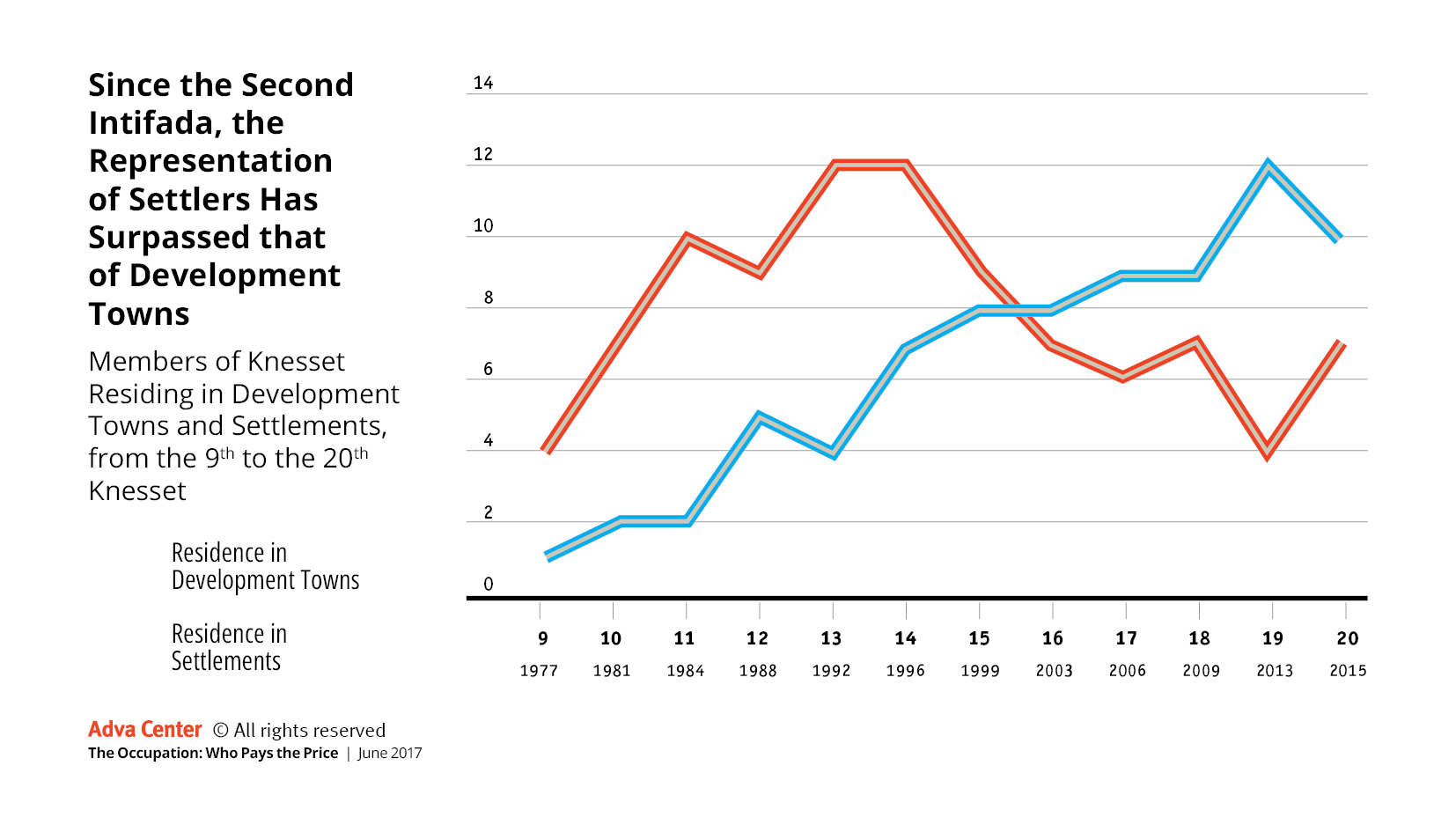
The economic top 1% is, in great measure, the result of the Emergency Economic Stabilization Plan of 1985, in which neo-liberalism "made Aliyah" to Israel. The plan reduced government involvement in the economy, defined economic growth as the primary economic goal and passed responsibility for economic growth onto the business sector. The result: privatization of public corporations, weakening of trade unions, reduction of unemployment benefits and the growth of a wealthy stratum at the top of which is the one percent with which we are all familiar.
The second one percent is the result of the fact that the settlements are at the heart of the conflict, led by the "ideological" settlers. These settlers have become a strong political force that opposes any political solution that would lead to the establishment of a Palestinian state. We are talking about between seventy and eighty thousand persons – close to 1% of the population of Israel. This is the group we have termed the political top 1%.
The power of this one percent can be clearly seen in the Knesset. In the period between the Begin government and the second intifada, the representation of the development towns – representing an agenda of equality and social justice – was higher than that of the settlers, representing an impasse in peace negotiations. Ever since the second intifada, the representation of settlers has been higher than that of residents of development towns.
Israel is a Country with Two Top 1% Groups
Anyone who wishes to understand why the Gini co-efficient of Israel is 0.360 – indicating that it is one of the most unequal countries in the west, needs to take into consideration the activities and impacts of the two top 1% groups, the economic and the political one.
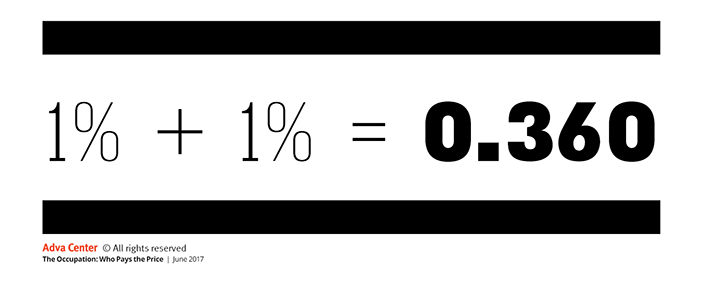
In other words, one needs to take into account at one and the same time neoliberal policies that increase inequality in income and assets, and Israel's policy on the Palestinian question, which hampers economic stability and, in so doing, diminishes the possibility of reducing inequality by developing the parts of the country that Israelis have become accustomed to calling "periphery." The answer to the question of why there is a miasma between "start-up nation" and the rest of Israel is to be found in the ability of the two top one percent groups to determine the public agenda and to prevent actions that might reduce inequality and include the whole population of Israel in the "start-up nation."
The two one-percent groups are not identical. One owns a great deal of property within and outside Israel and can relocate abroad in times of trouble; the other squats on the hills of Judea and Samaria, claiming divine title to the land, and will wage battle when threatened. One has been out of touch for years with the 99 percent faltering under a mortgage and the high cost of living, and feels at home in global financial circles; the other has been out of touch for years with the 99 percent who want a normal life without a national conflict or military reserve duty, and sees itself as the advance guard in a never-ending national-religious struggle. One supports political accommodation in hopes of economic stability and accelerated growth, but feels comfortable with the status quo; the other opposes political accommodation and knows how to exploit violent clashes to elicit legitimacy for its cause. Under the slogan, "the business sector trumps the public sector in everything," one is actively striving to weaken the public services established in Israel over the previous century, reduce the state budget, privatize government services, and establish private schools and health services. Meanwhile, the other manages to avoid the fallout from neoliberal policies and enjoys enhanced state allocations for defense, bypass roads, subsidized education, and the financing of municipal services. One benefits from the fact that the government chose to cope with the crises engendered by the Palestinian uprisings, particularly the second intifada, with measures taken from the neoliberal toolbox, while the other sees the Palestinian uprising as justification for its claim that "there is no partner for peace."
The state tries to remain in the good graces of both groups. It curries favor with one by offering cheap credit, cheap labor, low taxes and toothless regulation; while it panders to the other by providing the comprehensive, daily protection of the strongest army in the Middle East. One is praised as the standard bearer of growth; the other is embraced as the latest incarnation of the Zionist pioneer spirit.
The Day After
It is pure folly to think that it is possible to rule over millions of Palestinians without this having any effect on Israel. The public discourse on the conflict focuses on issues of morality and democracy. This report attempts to add to the public agenda the fact that the continuing conflict has a negative impact on the standard of living of most Israelis and contributes to inequality among us.
On the day after, many will ask themselves: why did we do this to ourselves?

We are grateful to The New Israel Fund for its ongoing support.
This graphic was produced and distributed in cooperation with
Heinrich-Boll-Stiftung e.V., The New Israel Fund, SISO and "Project 50-Out."
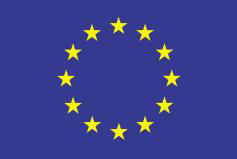
This project is co-funded by
The European Union
The contents of this publication are the sole responsibility of The Adva Center and do not necessarily reflect the views of the European Union
Adva Center
P.O. Box 6136401 • Telephone: 972-3-5608871 • Fax: 972-3-5602205
